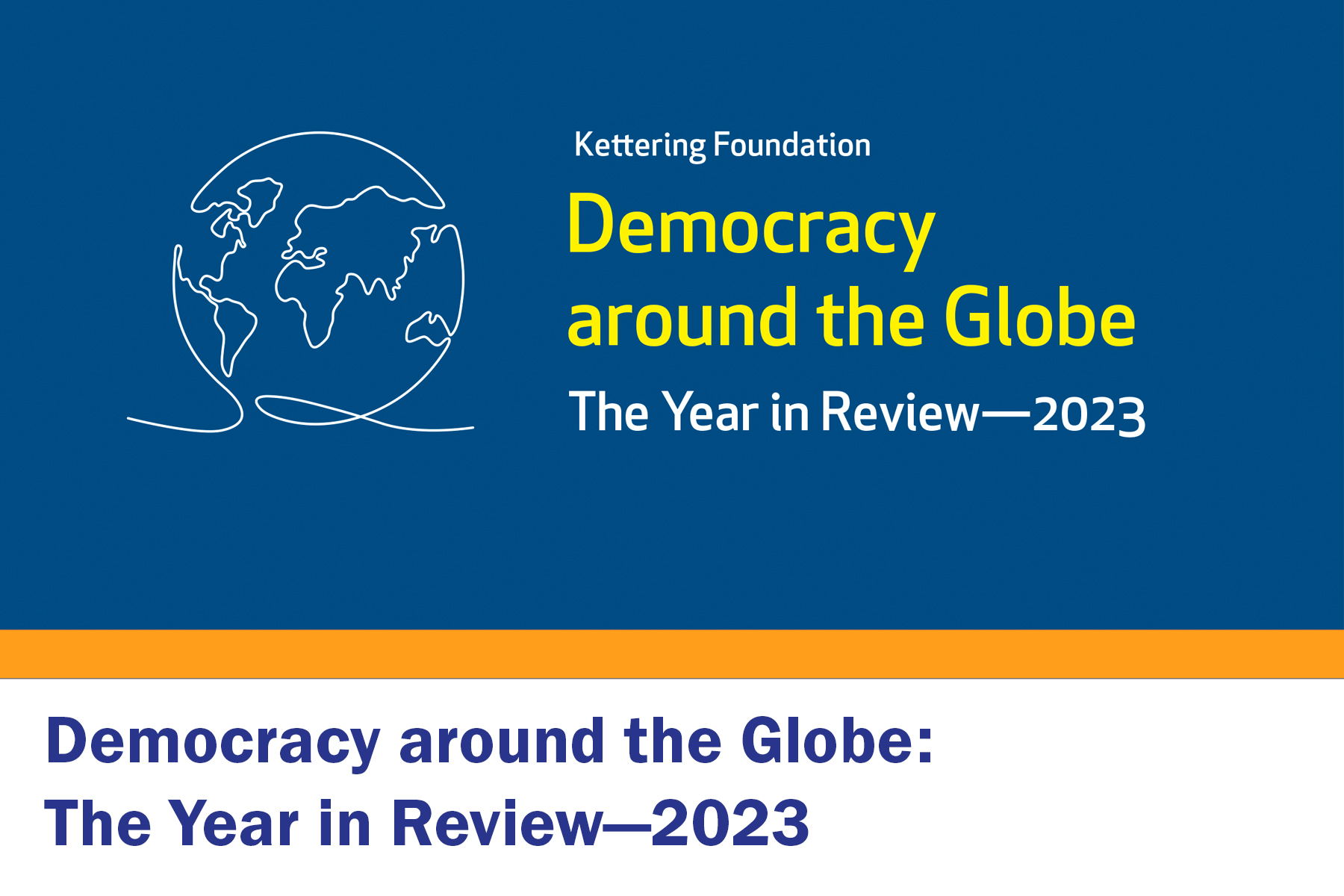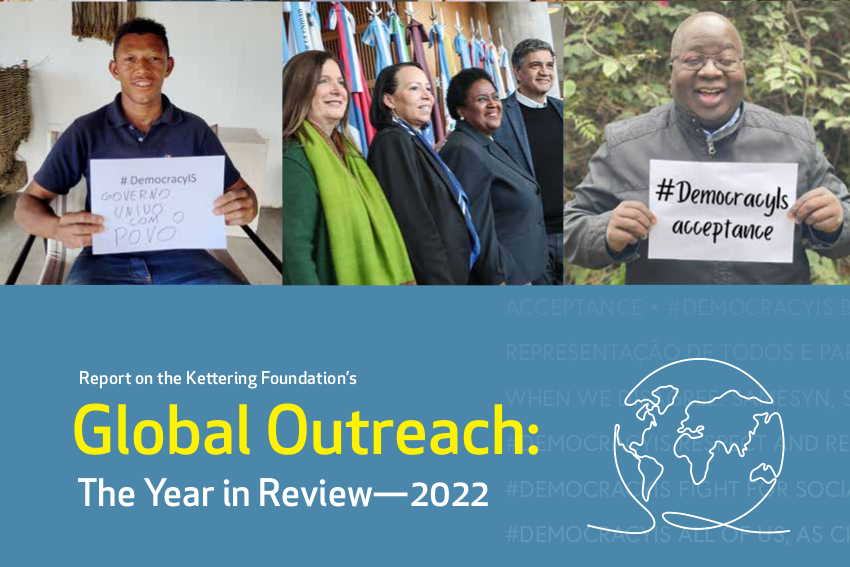Connections 2022: Innovating for Democracy
 Connections 2022 is a deep dive into Kettering research: what we’ve done — and where we want to move in the future. The issue, edited by Kettering Foundation Director of Communications Melinda Gilmore with Maura Casey, features research spearheaded by Kettering program staff and colleagues. It includes articles focused on how citizens and professionals are tackling the challenges of democracy, from elementary students developing deliberative citizenship to journalists rethinking how they engage with the community. One common theme runs throughout: The work of democracy includes experimenting and learning together. The authors invite you to learn with them and consider how you might innovate for democracy in your community.
Connections 2022 is a deep dive into Kettering research: what we’ve done — and where we want to move in the future. The issue, edited by Kettering Foundation Director of Communications Melinda Gilmore with Maura Casey, features research spearheaded by Kettering program staff and colleagues. It includes articles focused on how citizens and professionals are tackling the challenges of democracy, from elementary students developing deliberative citizenship to journalists rethinking how they engage with the community. One common theme runs throughout: The work of democracy includes experimenting and learning together. The authors invite you to learn with them and consider how you might innovate for democracy in your community.
Sharon Davies, “The Work of the Kettering Foundation: Challenges and Changes Ahead”
Kettering president and CEO Sharon L. Davies begins by reflecting on Kettering’s history and notes the many challenges democracies around the world are facing. As she writes, “it is important for those of us who are committed to defending democracy to take notice of those threats, understand their seriousness, and, when necessary, evolve and adapt our work in response to those threats.” She identifies a series of threats to democracy, including erosion in the rule of law, loss of confidence in institutions, the fraying of checks and balances, an assault on public education, and inequality in our systems. Kettering staff continues to reflect together about our work in relationship to these threats and has identified critical questions that will help to chart the course of the organization in the future.
Phillip D. Lurie, Udi Cohen, “The Citizens’ Accord Forum: Building a Shared Society in a Sustainable Democracy”
Kettering has been associated with the Citizens’ Accord Forum (CAF) for many years. CAF works to convene Israeli citizens, both Jews and Arabs, around issues of common interest, including the education of youth, youth at risk, domestic violence, and abuse of religious beliefs. This article describes efforts to create meaningful dialogue among people by recognizing the interconnections among different but related interests that can drive constructive exchange. CAF’s approach recognizes the many identities that individuals bring to a space and the need to reconcile tensions among the concerns they represent.
Elizabeth Gish, Camryn Wilson, “On the Formation of Citizens”
There are differences between service learning as used in higher education and models of community engagement that take an asset-based approach to public work. This article describes an example that was used at Western Kentucky University over the course of seven years with more than 1,000 students in a class called Citizen and the Self, which focused on citizenship and civic life. A primary assignment for this class involved a community deliberation project, which had students write a deliberation guide on an issue of concern for the community and then host a public deliberation that included participation by members of the community.
Sarah Murphy, Brad Rourke, “Learning Exchange: A Democratic Way of Working”
A small team at the Kettering Foundation was charged with interrogating how to convene hybrid meetings that include both in-person and online participants. This article describes the group’s findings. Originally focused on how to do meetings well in a virtual environment, the group shifted to a focus on designing meetings for collective learning. A few key takeaways include starting with the end goal in mind; providing equal footing for all participants; including diverse ways of learning; and recognizing the importance of relationship.
Scott London, “The Battle to Preserve Our Democracy: An Interview With Sharon L. Davies”
Sharon L. Davies became president and CEO of the Kettering Foundation in April 2022. Journalist and longtime Kettering collaborator Scott London sat down with her to talk about the threats facing democracy today, some early takeaways from her first months at the Kettering Foundation, and where she hopes to lead the foundation in the years ahead.
Mindy LaBreck, Stacie Molnar-Main, “Deliberative Pedagogy in Elementary Schools”
The authors explore ways that elementary school teachers include deliberative learning in classrooms for children ages 5 to 11 years old. During ongoing civic education exchanges that were held at the Kettering Foundation, educators identified the building blocks of deliberative citizenship. For deliberation to be truly successful, educators help students develop empathy, communication, a sense of agency, and a sense of being contributing members of a classroom community where all students are valued. Teachers design classroom activities to enhance these skills.
Joni Doherty, Melinda Gilmore, “Humanities Councils: Working for and With the Public”
A recent Kettering Foundation research exchange with six state humanities councils focused on how humanities councils can work with citizens, communities, and each other to invite and explore different perspectives on shared challenges. This article shares ways that humanities councils in diverse states, including Mississippi and Maine, approach the important work of strengthening democracy.
Alex Lovit, “Deliberation Tackles Tough Issues on Campus”
During the last three years, student affairs professionals developed issue guides for university students, not as an academic exercise in building deliberative skills or in exploring government policy but as a community conversation about issues affecting campus life. This article describes the use of the three issue guides, which were developed in partnership with the Kettering Foundation and NASPA, a national member organization of Student Affairs Administrators in Higher Education. Three guides explore topics that have provoked controversies on campus: free speech and the inclusive campus, the role of fraternities and sororities, and systemic racism. Despite the difficulties in holding forums that the COVID-19 pandemic presented, the 10 campuses that piloted the issue guides found that students had deliberative conversations that were diverse and deeply reflective.
Paula Ellis, “Breaking the Mold: Journalism Reimagined by Paloma Dallas”
This article discusses the work of journalist innovators who have moved their reporting toward strengthening democracy and away from journalism practices that may inadvertently increase polarization. Two offshoots of this work include a journalism textbook that Ellis has coauthored, “News for US: Citizen Centered Journalism,” and a volume of essays by journalists, “Reinventing Journalism to Strengthen Democracy: Insights from Innovators,” which discusses ways for the profession to forge new paths. As the authors write, “The two books are very different, and yet they are linked by the belief that journalists who work with and for citizens can make both journalism and democracy stronger.”
Valerie A. Lemmie, Kara Lindaman, “Reimagining Public Service, Professionalism, and Public Institutions: Fostering Democratic Practices”
The Kettering Foundation has worked for years with city managers and other officials who seek to work with the public in more democratic ways. This article explores the learnings of several groups of public officials and professors, who met at the foundation, and discussed ways to create greater responsiveness to marginalized communities and more equitable processes to engage citizens in complementary work.

